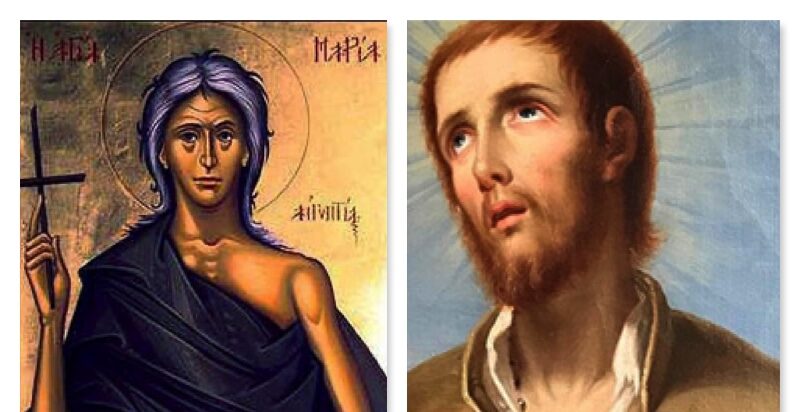Above left is St. Mary of Egypt and above right is St. Benedict Labre. Both were single celibates wandering around without community who later became canonized. It is not the ideal to go through life without a family or convent, but it is possible to become a saint in such unusual circumstances. This article is a follow up to Single-Celibacy and Consecrated-Virginity Part 1 from earlier this week. Let’s now look at what the Holy Spirit said through the Apostle Paul in 1 Corinthians 7:25-35. As always, words of Scripture will be in italics. My less-important commentary will be in orange bold.
Now concerning the betrothed, I have no command from the Lord, but I give my judgment as one who by the Lord’s mercy is trustworthy. I think that in view of the present distress it is good for a person to remain as he is. Are you bound to a wife? Do not seek to be free. Are you free from a wife? Do not seek a wife. But if you do marry, you have not sinned, and if a betrothed woman marries, she has not sinned.—1 Cor 7
Notice the Apostle Paul is clear that this life on earth is an ephemeral flash in the pan. Thus, if you can cling to the Lord with an undivided heart (without a burning in your loins) then you should. It’s really that simple. Your vocation is not going to come floating from a computer print-out in the sky. If you can keep continence and not commit self-abuse, you should remain single. Why? Because Jesus Himself said “The sons of this age marry and are given in marriage, but those who are considered worthy to attain to that age and to the resurrection from the dead neither marry nor are given in marriage, for they cannot die anymore, because they are equal to angels and are sons of God, being sons of the resurrection.”—Lk 20:34-36. That’s obviously not an Albigensian rejection of marriage. It’s simply the root of the infallible Council of Trent declaring that the single life is a higher calling than the married life when both are done for the right reasons.
Yet those who marry will have worldly troubles, and I would spare you that. This is what I mean, brothers: the appointed time has grown very short. From now on, let those who have wives live as though they had none, and those who mourn as though they were not mourning, and those who rejoice as though they were not rejoicing, and those who buy as though they had no goods, and those who deal with the world as though they had no dealings with it. For the present form of this world is passing away. I want you to be free from anxieties.—1 Cor 7
Many modernist Scriptural scholars say St. Paul wrote the above because they all believed Jesus was going to return right then. That’s not necessarily the case. St. Paul wrote “the appointed time has grown very short” to many early Christians who would die martyrs. What further proof than martyrdom do we need that “the appointed time has grown very short.” And yet we have had more Christian martyrs the last 100 years than the previous 19 centuries combined. Thus, with everything happening in the Deep Church and Deep State now in 2024, we can say more than ever that “the appointed time has grown very short.” If lived the right way, the celibate man or woman will more easily detach from worldly pleasures than married Catholics. The latter, according to St. Paul, “will have worldly troubles” because of who depends on them, too. And: “I would spare you that.” It’s really that simple. It’s not a dig on marriage. Rather, St. Paul’s words are eschatological in nature.
The unmarried man is anxious about the things of the Lord, how to please the Lord. But the married man is anxious about worldly things, how to please his wife, and his interests are divided. And the unmarried or betrothed woman is anxious about the things of the Lord, how to be holy in body and spirit. But the married woman is anxious about worldly things, how to please her husband. I say this for your own benefit, not to lay any restraint upon you, but to promote good order and to secure your undivided devotion to the Lord.
Modernists are so human-centered that they believe the celibacy of a priest is simply to bring them the sacraments. Similarly, they believe nuns simply show the value of the next life in heaven to married people. While both of these are true, it’s not the main reason we are celibate. The main reason is because we cling to the Lord with an undivided heart, regardless of success in a community or not. Regardless of holy orders or religious habit, the single celibate or consecrated virgin gives his or her life entirely to being holy in body and spirit. One doesn’t need an advanced canonical approbation or ecclesiastical politics to do that. This is especially true in this odd age of Church history. Regardless of when Christ returns, we are sure that we are currently closer to the end of the world than when St. Paul wrote. All the more reason to take 1 Cor 7 on celibacy and the eschaton seriously.
Donate to my future hermitage and chapel here.
